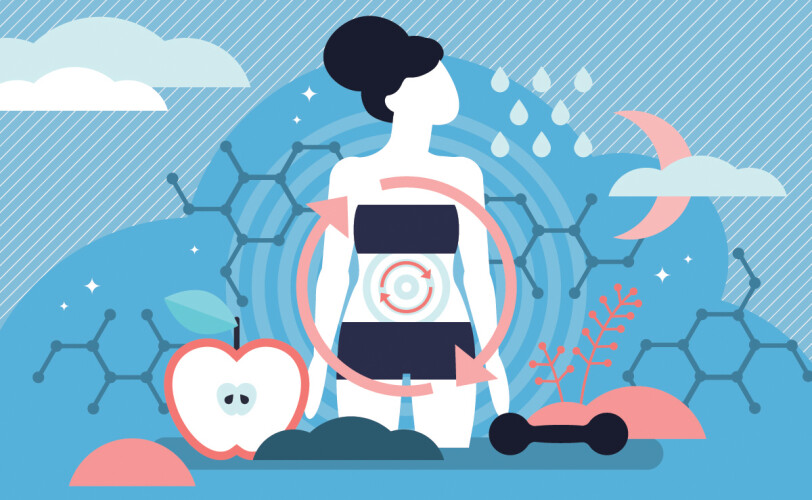3 reasons why your gut is not Las Vegas
I love this phrase ‘The gut is not Las Vegas’ as I think it is one of the best ways to explain the workings of our extraordinary gut. If this is the first time you have come across this phrase and are intrigued, please read on, let me explain.

First of all, why is the gut not Las Vegas?
Because what happens in the gut does not stay in the gut.
To put this in context, the most important thing to understand about the gut is that it has multidirectional links to the rest of the body. If we think about it, it is natural that it is linked, as all cells in the body require nutrients to function and survive. If the body cannot produce these nutrients itself (some are produced by the body), they have to come from what we ingest, in the form of food and drink. It does mean that if things go wrong in the gut, and the gut processes are impaired, there is a knock-on effect on other areas of the body.
Let me first describe in broad brief terms what the gut does. I would analogise it to a central hub of a complex interconnected logistic network where all the goods (sometimes not so good) come in to be broken down, converted, sorted and distributed. The distribution of these goods (nutrients broken down into chemical substances) occurs via multiple pathways to different destinations and is used in the body’s processes. The waste by-products from all this gut processing that are of no use to the body are then eliminated.
Therefore what happens in the gut is designed to go out, to serve the rest of the body. It is not designed to be contained for just the gut and the gut members.
Here are three ways how what happens in the gut does not stay in the gut.
1. What happens in the gut goes to the brain
We have trillions of microbes in our gut and they help us with a plethora of functions including making neurotransmitters such as serotonin and sending signals to the brain via the Vagus nerve (yes the gut may not be Las Vegas, but it uses the Vagus, hah!). The enteric nervous system in the gut is often termed the second brain and we talk about the gut- brain axis. The brain also sends signals to the gut, it is a bi-directional relationship. It is said that 80% of the communication is upwards from the gut microbiome to the brain.
An unhealthy gut could be in a state of dysbiosis, which means there is an imbalance between the beneficial and pathogenic bacteria, lack of microbial diversity or incorrect location of the bacteria with an overgrowth in the small intestine (SIBO). These conditions can all cause disruptions in neural signalling and serotonin production. Dysbiosis and SIBO are two main factors implicated in irritable bowel syndrome (IBS) and are linked to mood disorders such as depression and anxiety.
Dysbiosis can also cause intestinal hyperpermeability. This condition is better known as ‘leaky gut’, where the gut lining loses barrier integrity and the tight junctions between the cells that line the small intestine have gaps larger than it should. What this means is that toxic substances from the gut lumen can leak into the circulation and reach the brain which can progress to neuroinflammation. A leaky blood brain barrier (BBB) has been linked to a leaky gut and neuroinflammation is implicated in depressive disorders and neuronal degeneration disorders such as Alzheimer’s and Parkinson’s Disease.
The bottom line is if you want a healthy brain, you need to have a healthy gut.
2. What happens in the gut goes to the skin
The skin is a visible representation of what is happening in the gut. The skin cells need nutrients to function well and look healthy. If there are digestion and absorption problems in the gut, this can lead to nutrient deficiencies. The nutrients for good skin health include vitamin A, vitamin C, vitamin E and omega 3 fatty acids. Vitamins A, C and E provide antioxidants to combat oxidative stress. Oxidative stress is associated with age spots, psoriasis, rosacea, and ageing skin. Omega 3 provides fluidity to cell membranes and helps combat dry skin.
If what is happening in the gut is a whole load of sugar, this will cause more insulin secretion (more about insulin later). Insulin promotes sebum production and excess sebum contributes to acne.
Dysbiosis, as mentioned earlier, can cause intestinal hyperpermeability, from a poor gut lining and poor gut barrier integrity. This impacts the skin through the immune inflammatory response from toxins leaking into the bloodstream. Acne, eczema, and psoriasis are all associated with intestinal hyperpermeability.
We also need to consider allergies and intolerances which the gut has to deal with. An example is histamine intolerance that is associated with an imbalanced gut and this can manifest in the skin as rashes and hives.
The bottom line is if you want healthy skin, you need to have a healthy gut.
3. What happens in the gut goes to impact our energy levels
The food we ingest must be digested and absorbed efficiently for the nutrients to be released and delivered as fuel for our cells. If there is malabsorption, which could be due to an imbalanced gut and a poor gut lining, this could lead to nutrient deficiencies. Nutrients that our body needs for energy include iron, folate, vitamin B12, vitamin C and magnesium. Deficiencies in these can lead to fatigue.
All carbohydrates that we eat are eventually broken down into glucose in the gut and are used for energy. However, some carbohydrates such as refined starches (e.g. white rice, white bread, white pasta) and sugary foods (e.g. cakes, biscuits and chocolates) are broken down faster into glucose and quickly absorbed. These are released into the bloodstream giving a sharp rise of glucose in the blood. This triggers the hormone insulin to come and manage the situation to do its job of regulating blood glucose levels. It does this by taking the glucose from the blood and delivering it to the cells.
However, this sharp rise of sugar is followed by a sharp dip and you may relate to this if you feel that afternoon low energy after a refined carbohydrate rich lunch. This leaves you wanting to reach for the next sugary snack, seeking for that energy boost. You then end up on an energy peaks and troughs rollercoaster, while insulin is going manic trying to manage the situation.
What we put in our gut impacts what goes on in there, what gets distributed out of there and what goes on elsewhere.
The bottom line is if you want healthy energy levels, you need to have a healthy gut and watch what you put in it.
These are just three of many ways showing what happens in the gut does not stay in the gut. The much-researched gut microbiome is linked to immune health, hormones regulation, weight management, cardiovascular health and many more. I cannot stress enough how important it is to keep our gut microbes happy, healthy and balanced. Although these tiny little bugs may not be visible to the naked eye, they are certainly very transparent in their effects on our overall health and wellbeing.
The takeaway message here is clear and simple and I am sure you have already figured it out by now.
If you want a healthy whole body, you need a healthy gut.
Hippocrates said ‘all disease begins in the gut’
Let’s look after our guts!
You are probably thinking now well how do I do that, right? Well, I can support you with this. If you want to look after your gut health, please reach out to me.

Find a nutritionist dealing with Gut health
All nutrition professionals are verified



